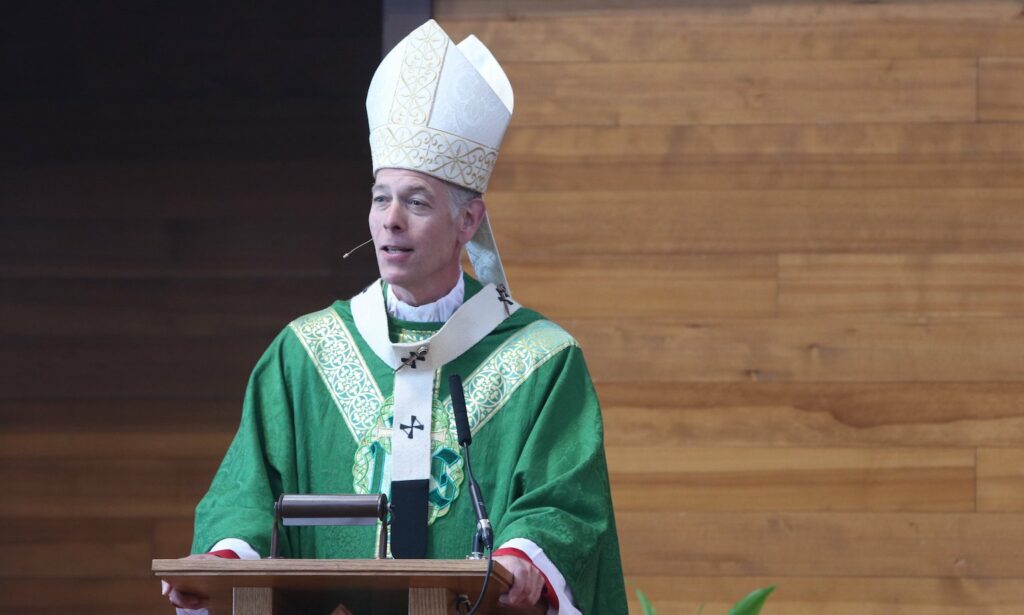PORTLAND, Ore. — Archbishop Alexander K. Sample of Portland publicly expressed “great disappointment and frustration” over Oregon Gov. Kate Brown’s new statewide restrictions that limit faith gatherings to 25 people.
In a statement Nov. 18, the day the restrictions took effect, the archbishop urged the governor to adopt “data-driven” protocols as Christmas approaches.
“It is unfortunate that a person’s ability to worship does not seem to be considered an essential activity,” said the archbishop. “I can assure you that the Catholic faithful under my pastoral care consider Sunday worship vital, especially when facing the challenges of the pandemic.”
Archbishop Sample said he understood the need to address the recent spike in COVID-19 cases but that the virus is not spreading in churches.
On Nov. 18, there were at least 12 new coronavirus deaths and 1,100 new cases reported in Oregon. Over the past week, there’s been an over 80% increase in cases from the average two weeks earlier. Public health officials attribute much of the increase to transmissions via social gatherings.
Since the pandemic began, however, there’s been a single outbreak linked to an Oregon faith community. The July outbreak — at a Pentecostal church in the eastern part of the state — was traced to a service in which congregants neither were practicing social distancing nor wearing masks.
Five priests have contracted COVID-19, but none of the cases can be traced back to church activity.
All 124 parishes in the Archdiocese of Portland have been “carefully following the masking, distancing and sanitizing protocols,” said Archbishop Sample. “They work.”
Under Brown’s two-week “freeze” that began Nov. 18, bars and restaurants can provide takeout only, gyms are closed and outdoor gatherings are restricted to no more than six people from two different households. There also are capacity limits at grocery stories and pharmacies.
The measures run through Dec. 2 for all counties and Dec. 16 for Multnomah County, home to more than half of the archdiocese’s Catholic population.
In the Portland region, parishes have been allowed 50 worshippers while some larger parishes in areas with lower COVID-19 cases have welcomed as many as 250 congregants. Under the new restrictions, parishes of all sizes and locations must limit occupancy to 25 people indoors and 50 people outdoors.
The archbishop said it would reflect sounder science to impose limits based on the capacity of a given church.
“Why are we limited to 25 people in a church that can seat 1,000 while certain businesses are allowed to operate on a percentage of capacity?” he said in his statement. The archbishop asked for the rationale behind the governor’s tighter restrictions on churches. “It is not data-driven,” he said. “It does not make sense.”
In Washington state, which is facing greater spread and tighter restrictions, Gov. Jay Inslee has implemented “much more reasonable” rules, said Archbishop Sample. Inslee has limited churches to 25% occupancy or a 200-person maximum.
“It follows science,” said the archbishop. “A similar policy makes sense for Oregon.”
Since the beginning of the pandemic, the Catholic Church and other faith communities “have bent over backwards” to observe Brown’s directives and implement strict protocols to keep people safe, continued Archbishop Sample. He noted that churches operate in a controlled environment, and parishes can keep people from having close contact with one another.
The archbishop asked Brown to reconsider her gathering restrictions on faith communities following the two-week freeze.
“We ask her to remember that the Christmas holiday is a little over a month away, and it is a season when people of many faiths turn to their churches,” he said. “We need a policy that matches our current situation, keeps people safe, and meets the spiritual needs of people of faith in Oregon.”
The archbishop said Catholics continue to pray for the governor and her staff “while she does the very challenging work of navigating the state of Oregon through this terrible pandemic.”
The Catholic Medical Association of Portland also has sent a letter to Brown.

